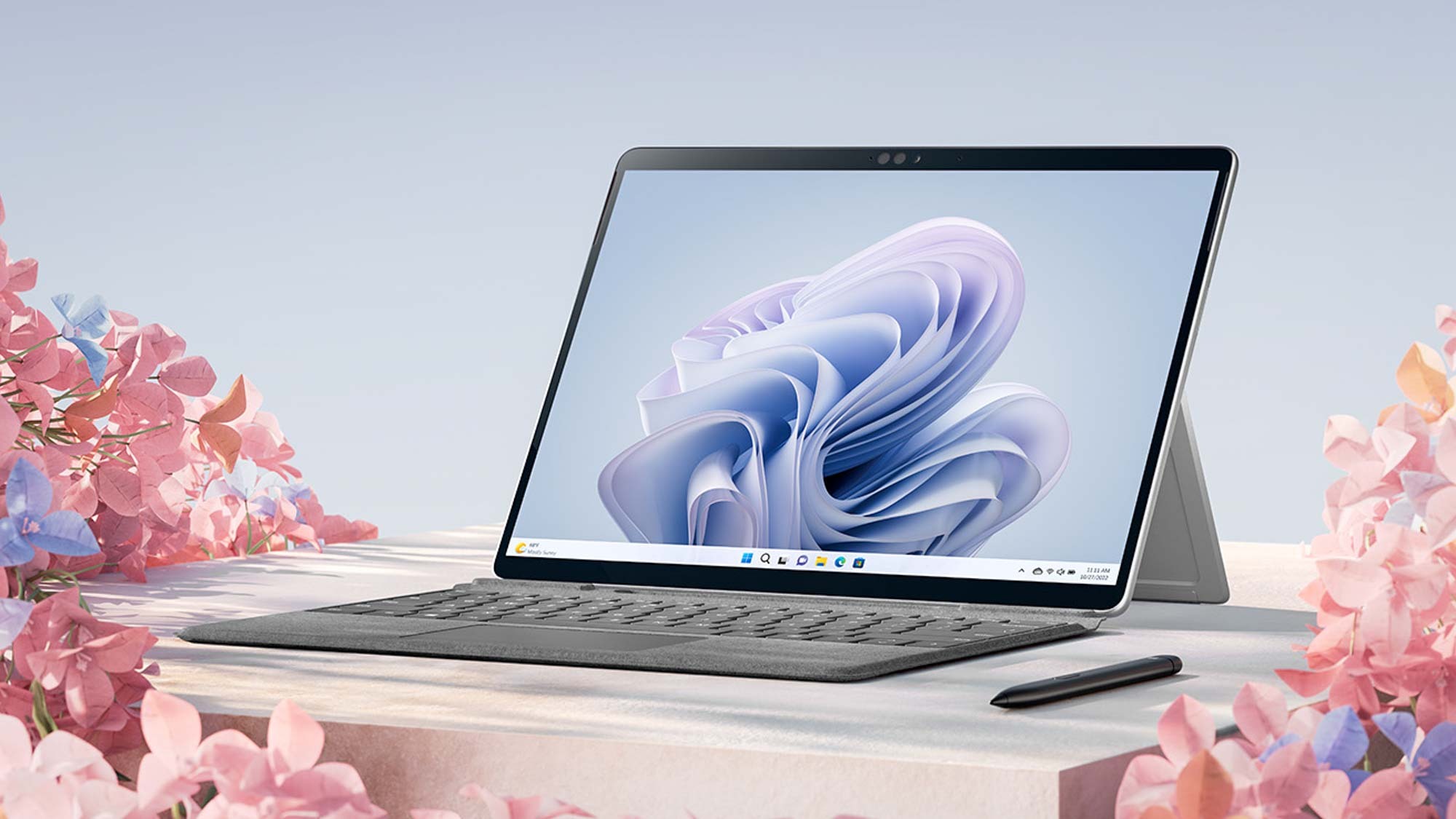Microsoft is losing the computing war to Apple — and the Surface Pro 9 is proof
The Windows on ARM future still has not arrived

So I was reading the first batch of Surface Pro 9 reviews, and a theme quickly emerged as I digested the highlights. (We have our own review of Microsoft's latest 2-in-1 device on the way.) Put bluntly, Windows on ARM is still not good enough —certainly not good enough to justify the very high $1,299 price ($1,579 with keyboard and stylus) for what should be one of the best laptops.
Let’s start with overall performance. There’s two versions of the Surface Pro 9: one with the SQ3 chip (Qualcomm and Microsoft) and one with an Intel 12th gen chip. According to Andrew Freedman over at Tom’s Hardware, the SQ3 model is way behind the MacBook Air M2 on a range of tests.
On Geekbench 5, which measures overall performance, the Surface Pro 9 (SQ3) hit 1,125 on single core and 5,849 on multi-core. Compare that to 1,932 and 8,919 for Apple’s laptop. They’re not in the same league.
How about a real-world test? On the publication’s Handbrake video transcoding test, the Surface Pro 9 (SQ3) took 12 minutes and 58 seconds (using the ARM native version), compared to the MacBook Air M2’s 7:52. To be fair, we don’t know how much faster or not the iPad Pro M2 is with a similar chip, but we’re in the process of testing exactly that.
The Surface Pro 9’s file transfer speed was also less than half that of the MacBook Air M2. So not a great start.
It gets worse. Over at The Verge, Surface Pro 9 reviewer Monica Chin ran into several problems with apps that have not been fully optimized for ARM, which resulted in serious lag and frustrating freezes. Check this out:
“I’d have only Slack open, and switching between channels would still take almost three seconds (yes, I timed it on my phone). Spotify, also with nothing in the background, would take 11 seconds to open, then be frozen for another four seconds before I could finally press play. When I typed in Chrome, I often saw significant lag, which led to all kinds of typos (because my words weren’t coming out until well after I’d written them).”
Add in video freezing on YouTube and Lightroom just crashing while trying to open and you’ll get the picture.
Microsoft has had a decade to get Windows on ARM to work, and it's still way behind Apple.
Now, there are Windows apps that run natively on ARM, and they are growing in number. These include the Edge browser (which I don’t want to use but whatever), Microsoft Teams (which was somehow still sluggish) and OneNote (which is described as zippy).
Other native apps include Firefox, Photoshop, VLC, Netflix, Handbrake and Zoom. But the progress just hasn’t been fast enough.
And this brings me to Microsoft’s overall problem. They have had nearly a decade of trying to get Windows on ARM to work. The Surface with Windows RT released way back in 2012 was the first ill-fated attempt. And since then we’ve seen a very inconsistent effort from Microsoft, Qualcomm and the entire Windows ecosystem of partners to make this whole experiment pay off.
When compared to Microsoft’s efforts, Apple’s approach with its own silicon — including its homegrown Rosetta 2 emulation layer — has worked flawlessly right from the start with the MacBook Air M1 and MacBook Pro M1. On Macs, I’ve never run into the types of compatibility or performance issues that the Surface Pro 9 is facing.
And there’s an army of M1 and M2 optimized apps now available, from Trello and Dropbox to Chrome and Lightroom. Yet, the emulation Apple offers is so superior the average user doesn’t notice what’s native and what’s not. They don’t have to care, and that’s the point.
Based on the early Surface Pro 9 reviews, there are some benefits to the version with SQ3. These includes 5G support and a range of enhancements for video calling using the Neural Processing Unit (NPU), such as portrait background blur and Voice Focus. The SQ3 model also promises significantly more battery life.
Overall, though, I would have a very hard time recommending someone spend this much money on a still-unproven platform. And Microsoft had better work out the Windows-on-ARM kinks before it falls even further behind in the computing wars. Because right now, it is losing.
Sign up to get the BEST of Tom's Guide direct to your inbox.
Get instant access to breaking news, the hottest reviews, great deals and helpful tips.
Mark Spoonauer is the global editor in chief of Tom's Guide and has covered technology for over 20 years. In addition to overseeing the direction of Tom's Guide, Mark specializes in covering all things mobile, having reviewed dozens of smartphones and other gadgets. He has spoken at key industry events and appears regularly on TV to discuss the latest trends, including Cheddar, Fox Business and other outlets. Mark was previously editor in chief of Laptop Mag, and his work has appeared in Wired, Popular Science and Inc. Follow him on Twitter at @mspoonauer.
-
Sim2er Apple doesn't support as much backwards compatibility as Microsoft. I'd rather support software with low performance than just dropping support entirely. I agree that Microsoft has a lot of work to do, but it isn't just Microsoft's responsibility; developers have to make arm native apps and drivers.Reply -
USAFRet Losing?Reply
I guess, if you consider 76% vs 14.5% as "losing"
https://www.statista.com/statistics/218089/global-market-share-of-windows-7/
Or 81.8% vs 7.9%
https://www.cnbc.com/2022/06/11/apple-could-gain-ground-against-microsoft-windows-with-m2-chips.html -
mkk97 I don't know why some writers insist on making it a direct competition between different ARM platforms. Nobody in the regular PC marketplace decides before their computer purchase which chipset they will purchase then decide which operating system makes the most sense based on that. They chose their OS platform based on their software needs, then they look at hardware. And if their software needs can be handled by any OS, then overall price, performance and capabilities become the next factors, no one marries themselves to ARM or Intel before taking those factors into consideration. So, ARM on Windows is not in direct competition with ARM on OS X or Android, it is in direct competition with Intel on Windows.Reply

